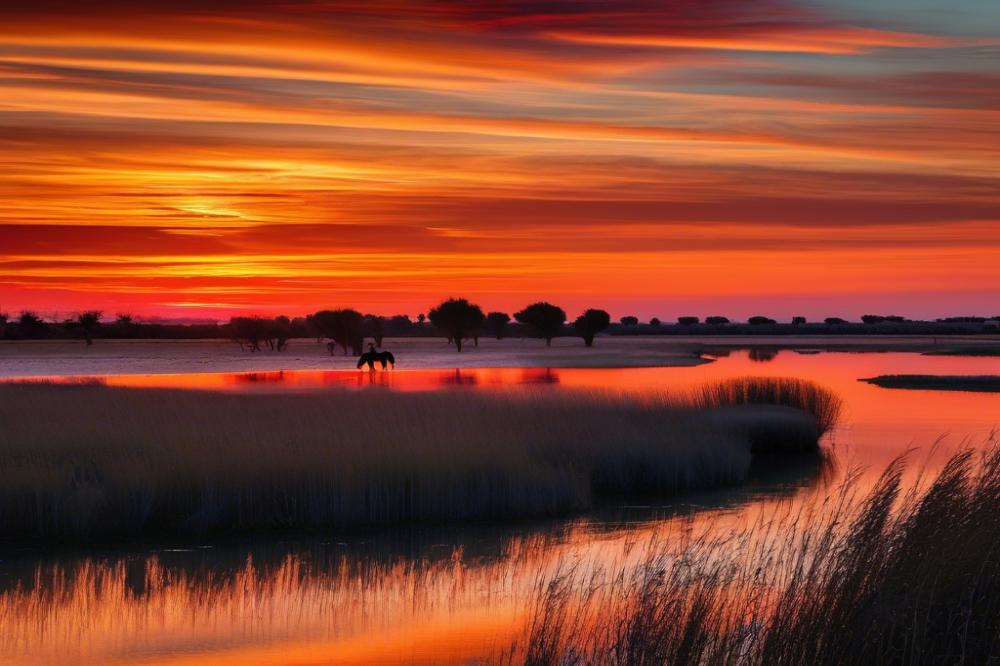Horses in Culture and the Camargue region
The significance of horses stretches across many cultures around the world. They are symbols of freedom, grace, and strength in folklore and traditions everywhere from Mongolia to the American West. Their impact goes beyond mere utility; horses often represent the bond between humanity and nature. Different regions develop their own ways of celebrating these majestic animals, each reflecting local customs and lifestyles.
In the Camargue region of France, the relationship with horses is particularly notable. This area, known for its wild landscapes and rich biodiversity, is home to the iconic Camargue horses. These animals are deeply woven into the fabric of life here, playing a vital role in local farming, festivals, and daily life. The influence of French equestrian culture is evident, as the horses are often seen in various events celebrating the traditions of the region.
This article will explore how horses are celebrated in the Camargue. Key sections will delve into the local history and traditions, the role of horses in farming and agriculture, as well as the vibrant festivals that honor these animals. Understanding this unique relationship offers insight into how deeply intertwined horses are with the identity of the Camargue.
Camargue horses
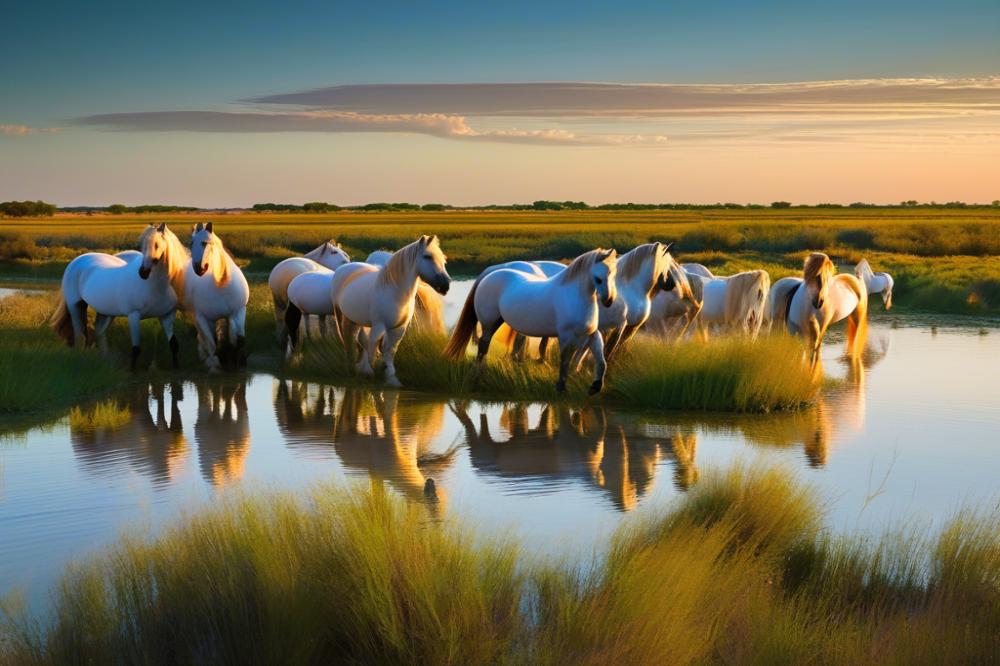
Camargue horses are a distinct breed known for their striking appearance and gentle temperament. These animals are usually white, especially as adults, but can be born dark grey or even black. Their coloration changes as they grow, leading to the iconic white horses seen galloping through the wetlands of the region. With a compact frame and strong limbs, these horses are well-suited for the marshy landscapes of the Camargue.
The history of breeding these animals dates back centuries. It is believed that the origins can be traced to ancient times when horses roamed freely in the delta of the Rhône River. The harsh environment has played a vital role in shaping their traits. This breed has adapted to the rugged terrain and unique ecosystem, making them resilient and agile. Local caretakers, known as “Guardians,” have bred these horses to maintain their health and vigor, ensuring that the lineage continues.
In local traditions, the presence of white horses holds deep significance. They are often seen as symbols of freedom and strength. Communities celebrate these animals during various festivals and events, showcasing their beauty and cultural importance. During traditional gatherings, the white horses play central roles in demonstrations of skill and unity. Their gracefulness inspires pride among the people, reminding them of their heritage in the Camargue area.
Cultural Heritage and Local Traditions
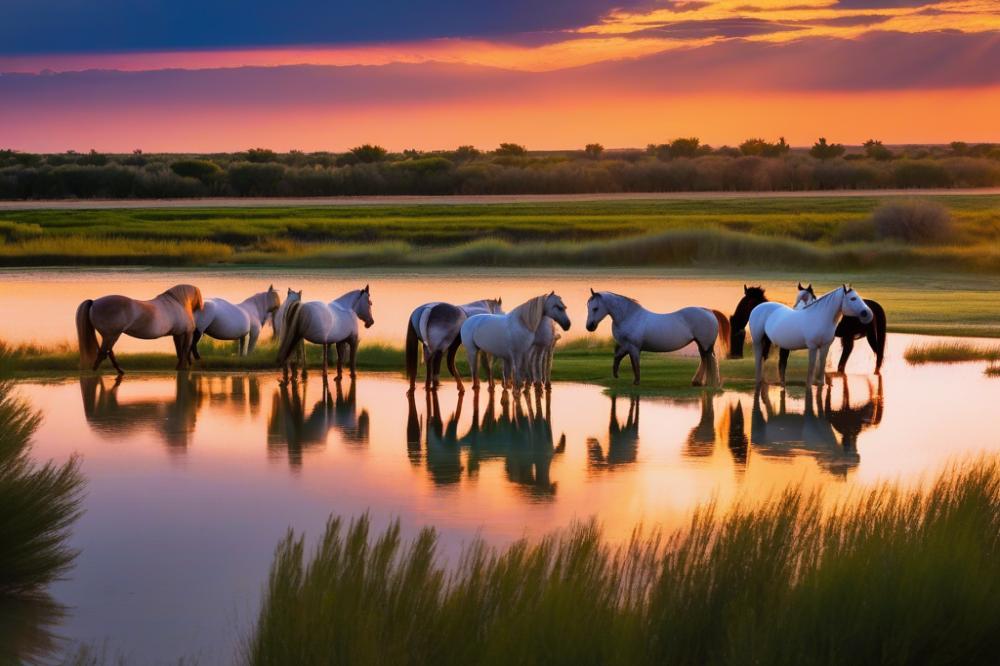
The Camargue region is known for its rich cultural heritage, and horses play a crucial role in that identity. This area is home to the stunning white horses, which have become symbols of local traditions. They are not just animals; they are part of the lifestyle that defines the region. People rely on these majestic creatures for herding the famous black bulls of the Camargue and for farming practices.
Traditional practices involving horses are deeply rooted in the community. Local cowboys, known as “gardians,” rely on their equine companions to manage livestock and navigate the rugged marshlands. Riding techniques have been passed down through generations, showing a strong connection to the land and animals. Children learn to ride at an early age, fostering a bond that carries into adulthood.
Horses are celebrated with enthusiasm during various festivals and events. One of the most vibrant occasions is the annual Feria de Nîmes, where horse shows and traditional riding demonstrations attract numerous visitors. During these events, locals proudly showcase their skills and their horses. Participants dress in traditional costumes, honoring the heritage with every gallop and twirl.
Additionally, the “Camarguaise” style of riding is unique to this region. The style emphasizes ease and partnership between horse and rider. Competitions often challenge riders to showcase their mastery, blending speed with traditional techniques. These displays of skill often draw in crowds, uniting the community in celebration.
Festivals provide opportunities to highlight the importance of horses in local life. Events like the “Festival de la Camargue” not only honor the horses but also celebrate the richness of cultural identity. Local food, music, and dance blend seamlessly with the equestrian activities, creating a festive atmosphere that engages all generations. The excitement of these gatherings creates lasting memories for families and friends alike.
Overall, the bond between the community and horses is significant in the Camargue. These noble animals are woven into the fabric of life here, helping to define the region’s unique character. They serve as a bridge between history and modernity, connecting people to their heritage while fostering a sense of unity and pride.
Horse Festivals in the Camargue Region
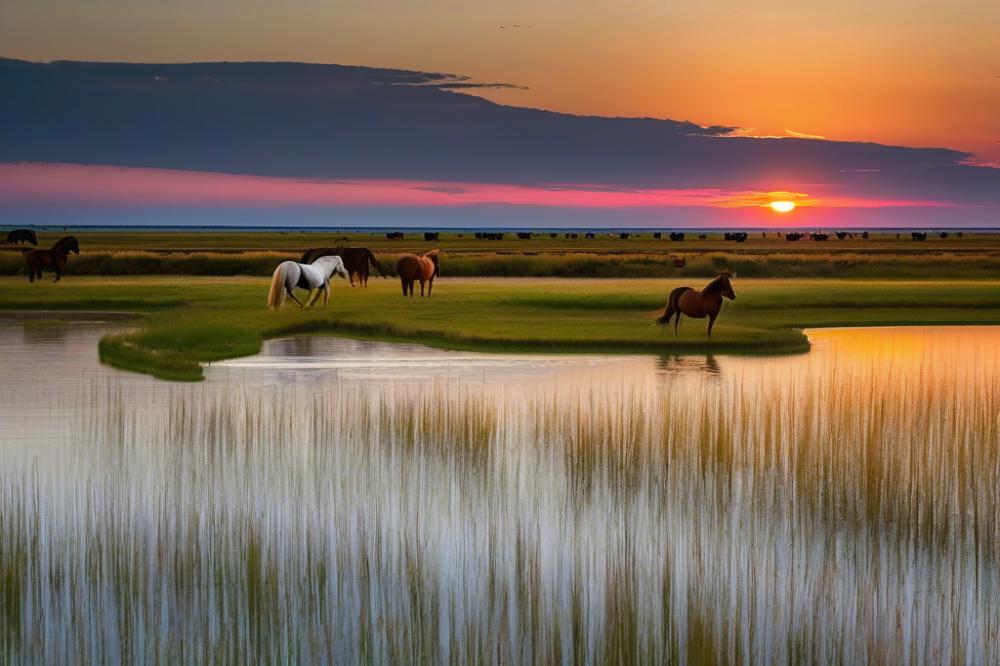
The Camargue region is known for its rich equestrian culture. Various horse festivals take place throughout the year. These events showcase the deep connection between locals and their horses. One of the oldest traditions is the “Fête de la Saintes-Maries-de-la-Mer,” held every May. This festive occasion combines religious ceremonies with horse parades. Participants dress their horses in colorful decorations. Many gather to celebrate their history and beliefs.
Another significant event is the “Feria du Cheval,” which occurs in early September. This festival features exciting competitions and demonstrations. Show jumping and dressage highlight the skills of professional riders. Many locals and tourists enjoy watching these talented horses and their riders perform. There are also fun activities for families. Games and rides create a lively atmosphere that attracts many visitors.
The “Camargue Horse Show” takes place during the summer months. Riders demonstrate traditional techniques honed over generations. Spectators witness the skills required to navigate the challenging landscapes of the region. Performances often include exciting displays of speed and agility. Local ranchers and trainers showcase their expertise and love for the horses.
Community bonding is essential during these festivals. People come together to share food, stories, and laughter. This sense of unity strengthens local ties. Tourism also benefits from these vibrant celebrations. Visitors travel from afar to experience the unique culture of the area. Local businesses thrive during the festival seasons. They offer food, souvenirs, and memories that last long after the events end.
In the Camargue, each festival reflects the area’s commitment to preserving equestrian heritage. Horses play a vital role in the culture. Festivals allow everyone to appreciate their beauty and significance. The excitement of each event highlights the strong bond between the people and their equine companions. Through these gatherings, traditions are celebrated and shared, ensuring the culture remains vibrant for generations to come.
Horse Ranches and Breeder Communities
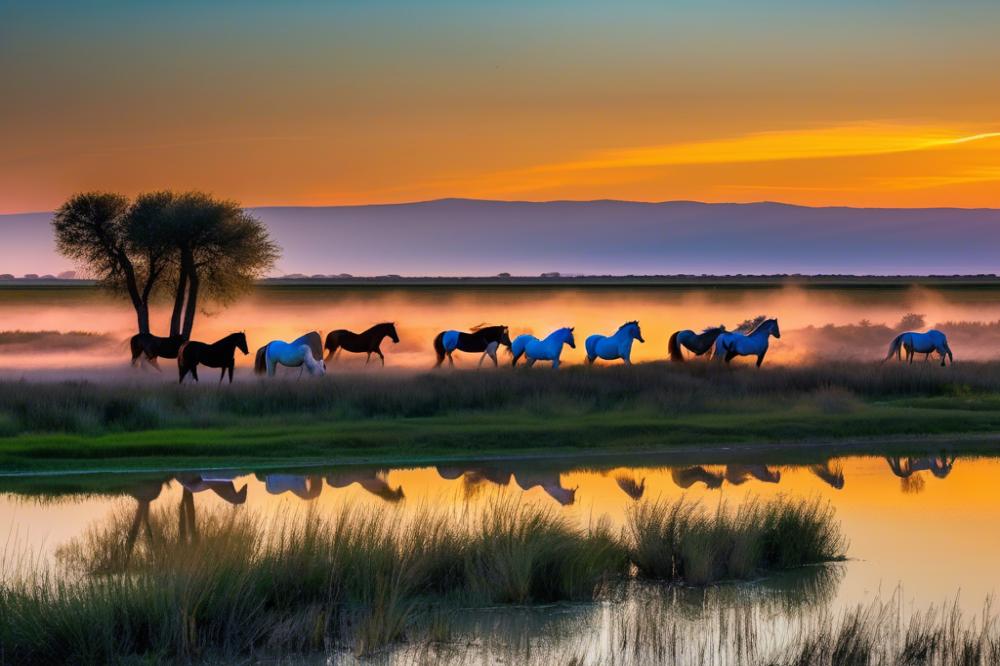
The Camargue region is famous for its beautiful landscapes and the celebration of its horses. Horse ranches play a crucial role in preserving the Camargue breed. These ranches, known locally as “manades,” offer a space where the traditional breeding of these unique animals continues to thrive.
Notable breeders have dedicated their lives to maintaining the quality and characteristics of the Camargue horse. One such breeder is the Grange family, who has a long history in this region. Their dedication to the breed has earned them respect throughout France. Another important figure is Claude Célestine. His expertise and passion for breeding have helped raise awareness about these beautiful animals.
Visitors can learn a great deal from these ranches. Guided tours often provide insight into the daily lives of horses and their caretakers. Many ranches offer educational programs designed to immerse tourists in the culture of the Camargue. Observing the bonding between the herders and their horses enriches the experience.
Traditional Horseback Riding Practices
This region boasts traditional horseback riding that is deeply rooted in its culture. Riders skillfully control their horses using techniques passed down through generations. Distinct styles reflect the traditions of the Camargue, with special emphasis on the way riders interact with their horses.
Techniques here are fascinating. Riders often employ a technique known as “course camarguaise,” where skills are tested through friendly competition. This practice showcases bravery and mastery of riding. Unique to this area, the style emphasizes both performance and connection with the horse.
The local lifestyle heavily influences these riding practices. Provencal culture is intertwined with ranching and horseback riding. Many community events revolve around horses, reinforcing their importance in daily life. Sharing stories of the past and present rides strengthens ties among locals.
Equine Tourism in the Camargue
In recent years, equine tourism has seen a remarkable rise in the Camargue region. Visitors from all over the world flock here to experience the beauty of its vast landscapes on horseback. Riding through the wetlands and flamingo-filled marshes captivates tourists. The Camargue invokes a sense of adventure that is hard to find elsewhere.
Furthermore, horse-related tourism significantly impacts the local economy. It brings jobs to the area and supports small businesses. Riding schools, guided tours, and local shops all thrive thanks to this influx of visitors. Hotels and restaurants also experience increased traffic. This boost provides many families and individuals with livelihoods.
There are countless experiential opportunities available for guests. Guided horseback rides let travelers explore the stunning scenery and vibrant wildlife. Watching the famous local ranchers, or “gardians,” in action offers a glimpse into traditional culture. Additionally, visitors can participate in rides tailored for all skill levels. Such options ensure everyone can join in on the fun.
For those seeking something different, sunset rides provide breathtaking views of the region. The golden glow of the setting sun reflecting off the water creates memorable moments. Another option is riding lessons for beginners. These sessions help newcomers build confidence and improve their skills. Whether on a leisurely ride or an educational excursion, the possibilities are abundant.
Celebrating the Equine Heritage of the Camargue
Throughout history, the bond between horses and the people of the Camargue region has flourished. These majestic creatures are not just animals; they symbolize freedom and tradition. Every year, thousands of visitors flock to horse festivals, joining local communities in vibrant celebrations. Events like the Gardians’ competitions showcase skills passed down through generations. Such displays not only honor the horses but also highlight the deep connection between the riders and their equine partners.
Horse culture in this area goes beyond mere festivities. It plays a vital role in the local identity. Families have thrived alongside these animals, incorporating them into daily life and work. Preserving this culture is essential for maintaining the delicate balance of the region’s ecosystem. The relationship between humans and horses helps keep traditions alive while promoting sustainable practices in agriculture and tourism.
People must recognize the importance of safeguarding this rich heritage. As modernization encroaches, there is a risk of losing the essence of what makes the Camargue region special. Efforts to educate future generations about equine stewardship can help maintain these cherished customs. By understanding their historical and cultural significance, communities can strive to pass on this legacy.
In closing, celebrating horses in the Camargue reflects a broader commitment to tradition and community. These festivals offer a glimpse into a lifestyle intertwined with nature and animal companionship. Protecting this equestrian heritage ensures that future generations will experience the unique beauty of this region and live by the same values that have shaped its identity.

